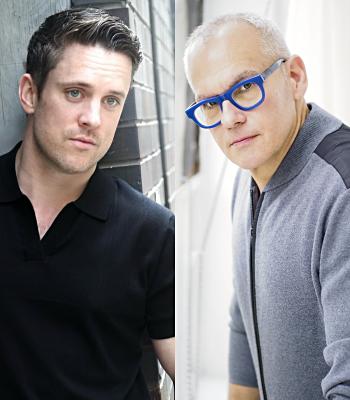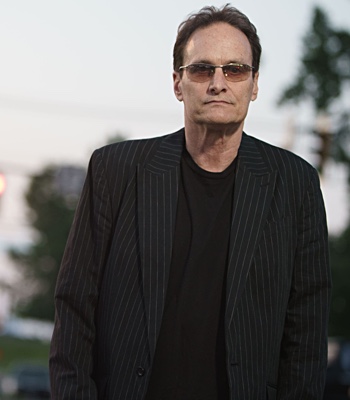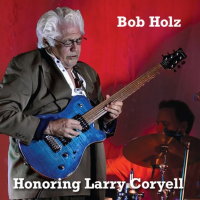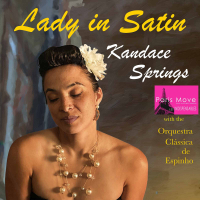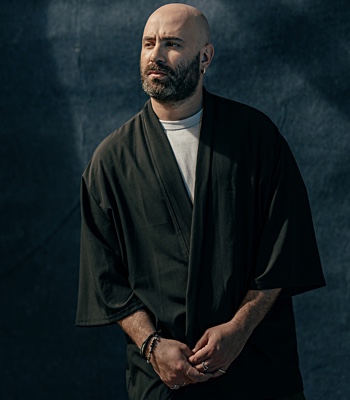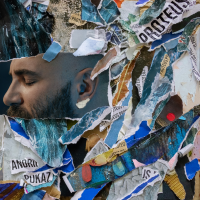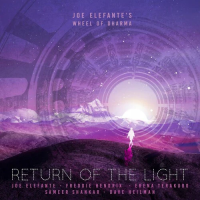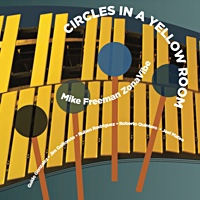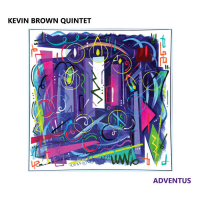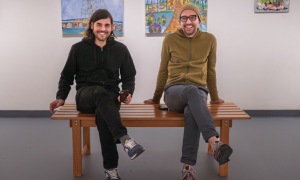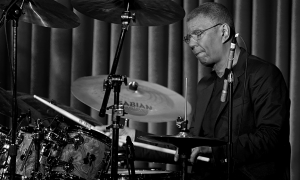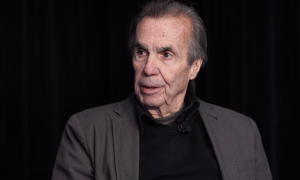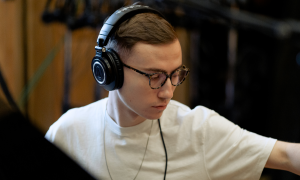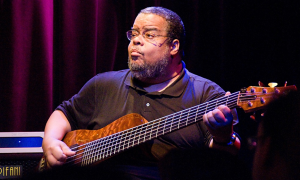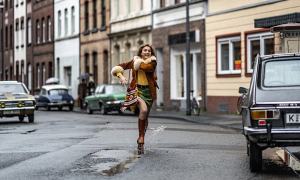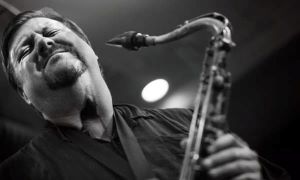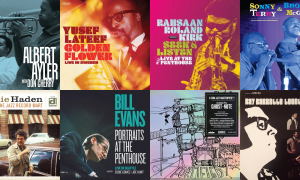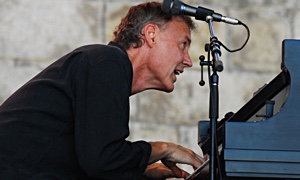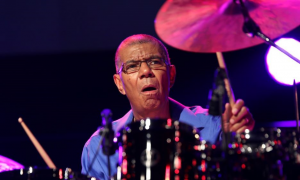Home » Jazz Articles » Interview » Derek Bailey Interview: September 2001
Derek Bailey Interview: September 2001
DB: Aah...
AAJ: There's a tricky one.
DB: Recording this kind of thing is funny. It doesn't always get onto the tape. Sometimes it sounds better on tape; you hear it and think "Fuck, I didn't realise it was as good as that." So, it's not reliable. But if it's a very good concert it usually turns out to be OK. It's difficult to destroy a good concert. The quality of the recording doesn't matter if it's a really good concert. Nowadays, I really like playing in studios. I didn't used to like it, but I've done a lot of recording in studios in the last few years, and it's just a different place to play.
AAJ: Do you approach studio recording in a different way to live recording?
DB: It depends. No. You see, a lot of the studio recording I've done is with people I've met for the first time in that studio. I just had a record come out called Fish with a Japanese drummer called Shoji Hano, on a label called PSF. He was over here with somebody, maybe Keiji Hano, I'm not sure. Anyway, he was doing some playing over here, and he asked me to make a record. I didn't know him, I'd never heard of him as a matter of fact, although he has been around for years. So I went down to Toby's studio [Moat] and played with him for a couple of hours and that has come out as a record. But that would have been different if it had been live, but I don't know if it would be better or worse. The main thing was that I was meeting this guy for the first time and we had to find out if we could play together. And we found out we could in a certain way, so we did that. Like when I played with The Ruins, the first time I played with them was in a studio and that was one of the best plays we had. We did a few concerts after that; we had a good one in Switzerland once. There were a number of concerts I didn't like; the one we played here I didn't like. The last concert we played was in New York and that was OK. I used to think that live had to be better, but I don't now. It depends. I think if I was playing regularly with someone whose playing I was familiar with, like Susie [Ibarra], I would certainly be more inclined...in fact, I would never go in a studio with Susie. We've got one or two things we might put out, but they're all from live things. So, with people I'm familiar with, I wouldn't go in a studio, but it's a good place to meet people.
AAJ: When you have made a recording or played a gig, you must have a spectrum of that was good, that was OK, that was crap.
DB: I think they're all great! (Laughs) No, I don't. It is always interesting to check them out on a recording. If it feels OK, I'm OK about it. That's the end of it. I have got about three recordings upstairs that have been sent to me by people, which I haven't listened to. For instance recently I played at Ryan's with Alan Wilkinson and Simon Fell. I played at Mark's place [Sound 323] with Simon. Earlier this year I played with Konk Pack I haven't got round to listening to them because of time. I felt happy with those concerts at the time. Last Saturday, this solo thing [at Sound 323] felt OK at the time; I felt quite comfortable. As far as I'm aware, no-one recorded it but two people videoed it. Videos are another thing; sometimes they are OK and sometimes they are horrific. I quite like videos. It seems to be another layer of information. Most people who don't like them complain about the sound. But, for instance, a musician I have admired in the past is Charlie Christian. If somebody said to me that they had a recording of Charlie Christian playing at Minton's in 1942, and I could have it as a sound recording or as a video...
AAJ: No contest!
DB: We put videos out. The quality is dreadful, but as long as the sound is adequate, I'm not bothered about the visual quality. I put out one of John Stevens and I, after John had died. I didn't know it existed until after he had died. It is of a gig in a pub, and is so typical. I thought it would be nice just for the sake of that. But nobody buys them. Americans buy them a little bit, but nobody over here wants them. Or maybe it's just our videos they don't buy! I can only think of one occasion where anyone has reviewed a video of ours. One guy reviewed them all in a Canadian paper.
I've got videos of nearly all of the Company Weeks, for instance. But to get into that... it's bad enough putting a Company record out, the time you have to put into it... I've thought about doing something like that, but it's the time. There are usually more pressing things to do.
AAJ: You have talked about playing "in company." How does your solo playing fit in with that?
DB: Solo concerts are murder, I find; I don't like doing them. But I get offered a lot of them. That's why I try to turn them into something else. If I do one, I need to do something else in addition. The talking -saying something at some point -is actually necessary; it doesn't matter what I talk about. At least, I find it necessary; I know people who do solo concerts and never say a word, which is fine. But I find that if I do that, it is different after I've done it. It kind of serves as an interval for me, even though I'm still working, as it were. The thing feels a bit different. So I find that useful, from a playing point of view. I've always done a bit of it, once I'd found it works. When I used to do solo concerts some years ago, I used to go to elaborate lengths to break the tedium. I used to have a reel to reel tape, that ran for half an hour, and there would be about three or four events on it, anywhere on it, lasting for two or three minutes; one was me kicking a football around in a fire station, just some sounds; another was a recording of an African village chant. I'd set the tape up anywhere, so I didn't know when it would come up. But it kind of broke this inclination for it to get over focused. That's a personal feeling about it; it was a distraction, which you get with other people. So it's a substitute for other people, in a way. But talking and playing can be a bit like that; the purpose is similar.
AAJ: It is interesting to hear you say you don't like playing solo gigs..
DB: I like playing any way, but compared to playing with people, I think playing solo is a second rate activity, really. For me, playing is about playing with other people. In the absence of that, I am happy to play solo, but I don't think there is any comparison. Even if it is difficult playing with other people -sometimes it's great, sometimes it isn't, but that is kind of the point of it. It loses its point playing solo. Then it isn't pointless, but it becomes a different thing. It is very difficult if you are doing it regularly, which at one point I did. It becomes very difficult not to build up a sort of repertoire, which is anathema to the music, in my view. You can develop a solo performance, and then you finish up with a solo performance; you might as well be playing Bach. Tricky.
AAJ: Once you've moved away from solo, do you prefer duos? You've certainly done a lot of duos, haven't you?
DB: That is usually economic. I'd like trios and quartets actually, but I like duos because a lot of musicians who I like playing with like playing duos. Han Bennink, for instance, likes playing duos. He doesn't care, he'll play anything with anybody, but duo is a form he likes playing. And I find that playing a duo with Han is better than playing in a larger group with Han, partly because he likes it. Trios are nice but not easy to come by. I usually seem to finish up in duos. I like duos with percussionists. I like the songs that percussionists sing. In this kind of music, I think that most of the outstanding musicians are percussionists, and they have nearly always been the leaders in some way -Tony Oxley, John Stevens, one of the most interesting percussionists to me was Jamie Muir. They have always been instructive to play with. They are literally freer players. It might be the lack of concern with pitch or something, I don't know. Their instruments are often a wider resource than other instruments. In free playing, there are maybe three or four styles of saxophone playing, but for percussionists there are dozens of styles, loads of different approaches to playing. Nowadays, there is a wide range of guitar approaches to playing this kind of music, much wider than there used to be.
AAJ: Of younger improvising guitarists, who would you say is noteworthy?
DB: Younger players in this music often turn out to be middle aged; it is not a young music. It used to be, but I suppose you could say that about a lot of things. I think Alex Ward is a good player. He is essentially a clarinetist, but then he is also a good pianist. I think what he does on guitar is good. Rod Poole, who is on this guitar trio recorded in LA, he is English but lives in LA. He is a very interesting player. There is a Portuguese guy called Mota, Manuel Mota -I think that's his name, but I've forgotten. He is really quite intriguing, I saw him play a couple of years ago in Lisbon. He plays finger style on a solid electric. He didn't play much or a long time -about twenty minutes -and what he played I thought was really interesting, quite radical. In this area it is difficult for anyone to be radical these days. Noel Akchoté is good. I think there are a lot of them around. In the States particularly, there is a whole bunch of newer guys who have come up. Some have a tendency to work out of the blues, which I don't particularly like myself. I think the blues is fine for blues players, but free blues has never made much sense to me. There are plenty of guitar players at the moment. Guitarists and electronics seem to be the more rife presences.
Tags
PREVIOUS / NEXT
Support All About Jazz
 All About Jazz has been a pillar of jazz since 1995, championing it as an art form and, more importantly, supporting the musicians who make it. Our enduring commitment has made "AAJ" one of the most culturally important websites of its kind, read by hundreds of thousands of fans, musicians and industry figures every month.
All About Jazz has been a pillar of jazz since 1995, championing it as an art form and, more importantly, supporting the musicians who make it. Our enduring commitment has made "AAJ" one of the most culturally important websites of its kind, read by hundreds of thousands of fans, musicians and industry figures every month.





